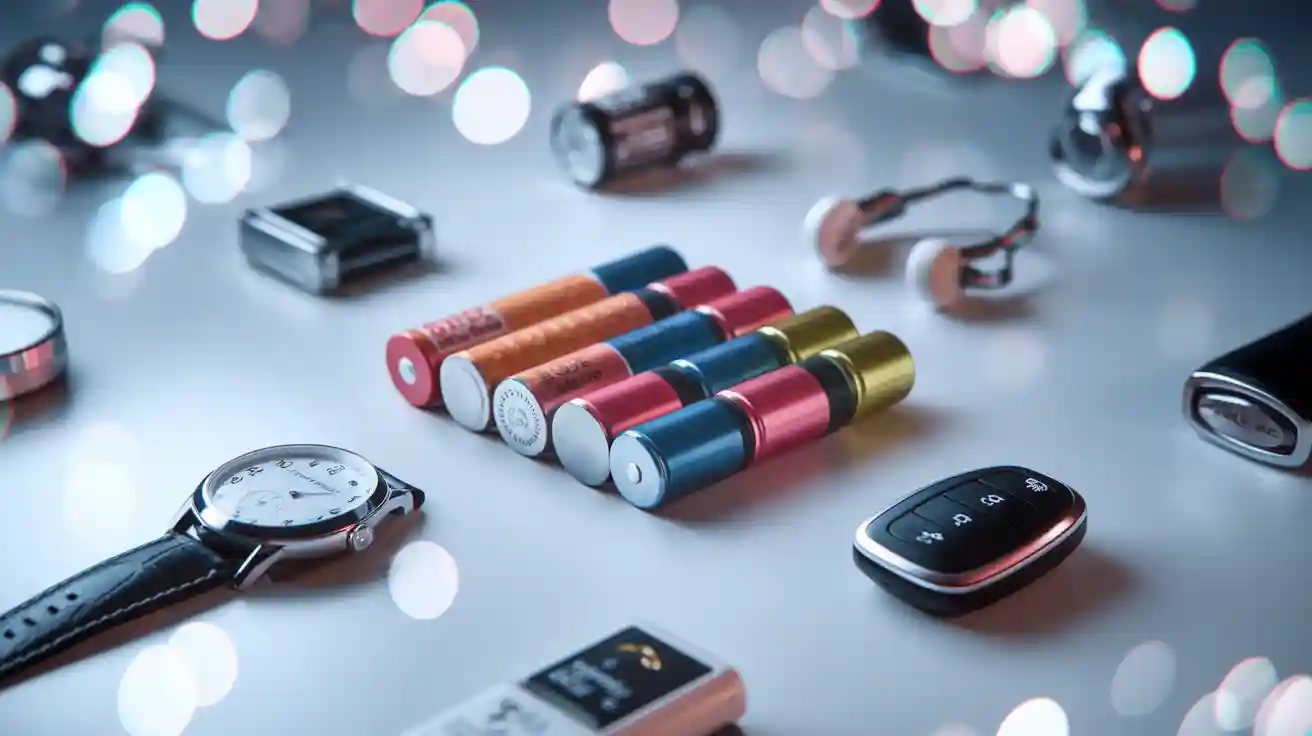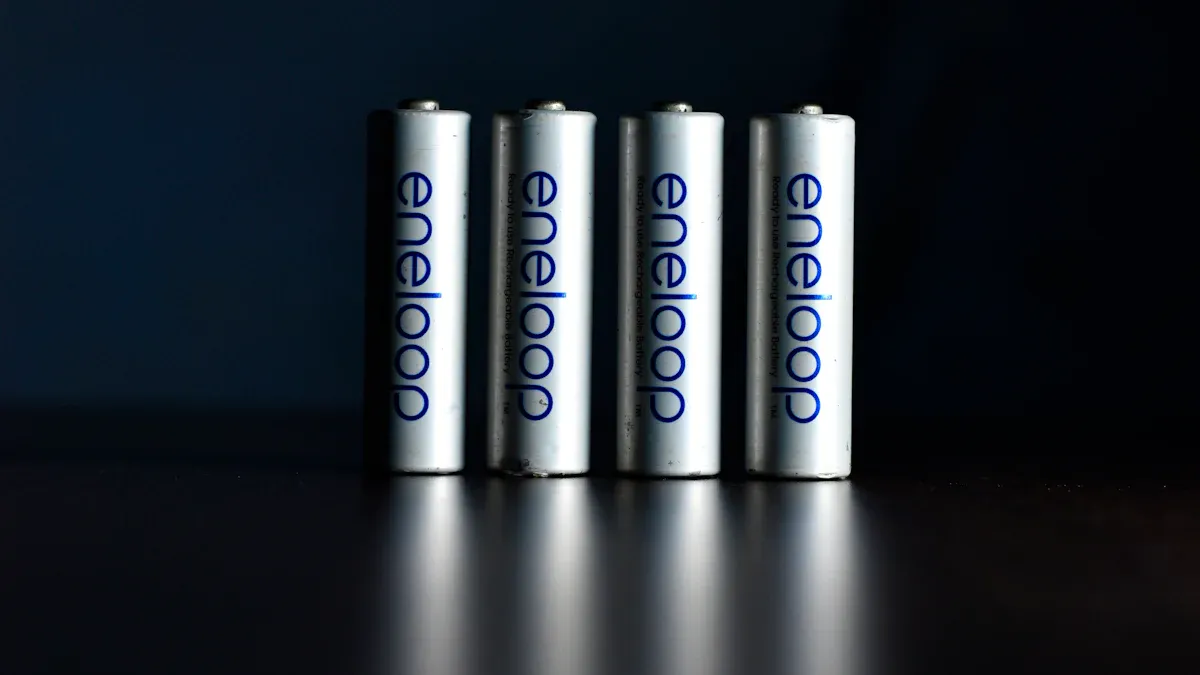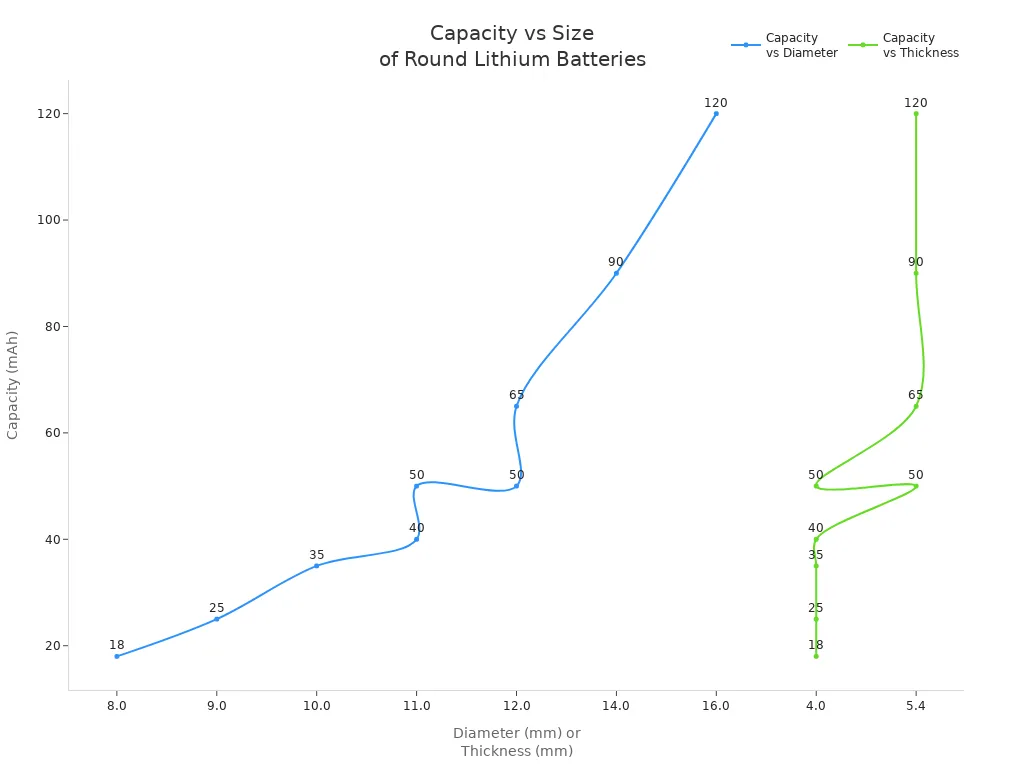
You will find three main types of round lithium batteries: steel-shell cylindrical, steel-shell button-type, and soft-pack round LiPo batteries. Steel-shell cylindrical batteries often power electric vehicles and consumer electronics. Button-type batteries fit best in wearables and Bluetooth devices. Soft-pack round batteries appear in smartphones and laptops, but their shipments dropped by 2.6% in 2023 due to lower demand. Choosing the right battery type for your device matters for both safety and performance. Different types of lithium batteries offer unique benefits and risks, so you should always check for quality and proper fit.
Here is a quick look at the latest market share for these battery types:
| Battery Type | Market Share / Shipment Data | Region / Application Focus | Market Size & Growth (2025-2030) |
|---|---|---|---|
| Steel-shell Cylindrical Lithium | Asia-Pacific holds ~57% market share | Dominated by China and South Korea; EVs, consumer electronics | Market valued at $15-$17 billion in 2025; CAGR 7.5%-9% |
| Batteries | Europe growing at 7.5%-9%, led by Germany | Focus on EV batteries and sustainable solutions | Expected market size $23-$26 billion by 2030 |
| MEA and South America smaller but growing markets | MEA: smart home apps; South America: laptops, power banks |

What Are Round Lithium Batteries?
Key Features
Round lithium batteries stand out because of their unique shape and advanced technology. You will find that these batteries use a cylindrical or button-like design, which helps improve both performance and reliability. Most round lithium batteries use lithium ion chemistry, making them lightweight and powerful. This technology allows you to enjoy high energy density, so your devices last longer between charges.
Here are some important features you should know:
- High energy density gives you more power in a smaller space.
- The mature winding process in manufacturing leads to stable quality and fewer defects.
- These batteries offer a consistent discharge platform, which means steady performance for your devices.
- The design makes tab welding easier, improving battery quality and safety.
- You can find round lithium batteries in many sizes, so they fit a wide range of products.
Note: Round lithium battery technology supports both primary (single-use) and rechargeable options, making it flexible for different needs.
| Characteristic | Round (Cylindrical) Lithium Batteries | Other Shapes (Rectangular, Pouch) |
|---|---|---|
| Manufacturing Process | Mature, automated winding; stable, low cost | Lamination, semi-manual, less automation |
| Product Quality | Higher quality, fewer defects | Higher defect probability |
| Packing Scheme | Simple, good heat dissipation | Complex, heat dissipation challenges |
| Structural Features | Reliable long-term performance | Performance degrades faster |
Why Shape Matters
The shape of lithium batteries affects how you use them. Round lithium batteries fit well in devices where space is tight or where you need a reliable, compact power source. The circular form factor lets you save space and arrange batteries efficiently. This is why you see round lithium batteries in wearables, medical devices, toys, and power tools.
Round lithium battery technology also makes it easier to customize sizes and shapes for special applications. The sturdy structure of cylindrical lithium batteries means they handle vibration and stress better than pouch or prismatic types. You get a battery that lasts longer and keeps your devices safe.
When you choose lithium battery technology, you benefit from proven reliability, cost-effective production, and strong safety features. The right shape ensures your lithium ion batteries deliver the best performance for your needs.
Types of Round Lithium Batteries

You will find three main types of round lithium batteries: steel-shell cylindrical, steel-shell button-type, and soft-pack round LiPo battery. Each type has a unique structure and form factor. You need to understand these differences to choose the right battery for your device.
Here is a quick comparison of their main structural features:
| Battery Type | Shell Material | Packaging Method | Internal Structure/Features |
|---|---|---|---|
| Steel-shell Cylindrical | Steel or Aluminum shell | Welding (laser welding) | Winding process inside; safety valve, PTC element, current cut-off |
| Steel-shell Button-type | Metal shell (smaller) | Welding | Larger positive electrode case; mesh structure in negative electrode case |
| Soft-pack Round LiPo | Aluminum-plastic film | Thermal packaging | Flexible laminated film; bulges for safety; lighter weight; customizable |
Steel-Shell Cylindrical
Steel-shell cylindrical batteries are the most common round lithium batteries. You will see them in many devices because they offer strong mechanical protection and stable performance. The steel or aluminum shell keeps the battery safe from impacts and leaks. Inside, the winding process packs the lithium ion materials tightly, which helps the battery last longer.
You can find these batteries in many sizes. The most popular models include 14500, 18500, 18650, 21700, and 26650. These models have different voltages and capacities, so you can match them to your device’s needs.
| Battery Model | Nominal Voltage (V) | Typical Capacity Range (mAh) |
|---|---|---|
| 14500 | 3.7 | 600 – 800 |
| 18500 | 3.7 | 1200 – 1600 |
| 18650 | 3.7 | 1000 – 3250 |
| 21700 | 3.7 | 4000 – 4800 |
| 26650 | 3.2 | 3000 – 3400 |
| 32650 | 3.7 | ~6000 |

You will often use steel-shell cylindrical lithium batteries in power tools, e-bikes, and backup power systems. The steel shell gives you high safety and durability. The compact design makes them easy to stack or arrange in battery packs. These batteries also include safety features like a safety valve and PTC element, which protect against overheating and short circuits.
Steel-Shell Button-Type
Steel-shell button-type batteries, also called coin cells, are small and flat. You will find them in devices that need a tiny, long-lasting power source. These batteries use a metal shell, but the positive electrode case is larger than the negative electrode case. The negative side often has a mesh structure to help with electrical contact.
Most button-type lithium batteries measure between 5 mm and 32 mm in diameter and 1 mm to 6 mm in thickness. They work best in low-drain devices like wristwatches, calculators, and medical sensors. You will also see them in car keys and hearing aids.
Note: Button-type lithium batteries must meet strict safety standards. Devices that use them need secure battery compartments to prevent children from removing or swallowing the batteries. The batteries must pass tests for drops, impacts, and repeated use.
You get high energy density and a long shelf life with these batteries. They are perfect for backup power and memory retention in small electronics. Their small size and reliable performance make them a top choice for compact devices.
Soft-Pack Round LiPo Battery
Soft-pack round LiPo batteries, also known as round lithium polymer batteries, use a flexible aluminum-plastic film for packaging. This makes them about 40% lighter than steel-shell batteries of the same capacity. You can shape these batteries to fit almost any device, which gives you more design freedom.
- The flexible packaging lets the battery bulge safely if there is too much pressure, instead of exploding.
- You can make these batteries very thin, even down to 0.5 mm.
- The internal resistance is lower, so you get better performance and longer cycle life.
- You can customize the shape and size for wearables, smart cards, and medical devices.
| Advantage Aspect | Soft-Pack (Pouch) LiPo Batteries | Steel-Shell Batteries |
|---|---|---|
| Packaging Material | Aluminum-plastic film (flexible) | Steel casing (rigid) |
| Weight | 40% lighter than steel-shell batteries | Heavier due to steel casing |
| Flexibility | Customizable shapes and sizes | Limited by rigid shape |
| Internal Resistance | Lower | Higher |
| Cycle Life | Less capacity loss after 100 cycles | More capacity loss |
You will see round LiPo batteries in smartwatches, fitness trackers, and other wearables. Their light weight and flexible design help you create thinner, more comfortable devices. The round lipo battery also works well in medical sensors and compact electronics where space is limited.

Tip: If you need a battery that fits a unique shape or needs to be very light, choose a soft-pack round lipo battery. You will get better space use and safer operation.
You can see that each of these lithium battery types offers unique benefits. Steel-shell cylindrical batteries give you strength and safety. Steel-shell button-type batteries give you small size and long life. Soft-pack round lipo batteries give you flexibility and light weight. When you know the differences, you can pick the best battery for your application.
Advantages of Round Lithium Batteries
High Energy Density
You get one of the biggest advantages with round lithium batteries: high energy density. These batteries store more energy in a smaller and lighter package than nickel-metal hydride or lead-acid batteries. For example, lithium batteries can reach specific energy values up to 100 Wh/kg, while nickel-metal hydride batteries usually stay between 60 and 80 Wh/kg. This means you can power your devices longer without adding extra weight. Devices like portable power stations, electric vehicles, and mobile power banks all benefit from this high energy density. You will notice that lithium batteries also have a higher working voltage, making them ideal for electronics that need strong, steady power.
| Battery Type | Cell Voltage (V) | Specific Energy (Wh/kg) | Energy Density (kWh/m3) |
|---|---|---|---|
| NiMH | 1.2 | 1 – 80 | 70 – 100 |
| Lithium-ion | 3.6 | 3 – 100 | 80 – 200 |
Tip: High energy density lets you enjoy longer operating times and lighter devices, which is especially important for wearables and portable electronics.
Mechanical Stability
Round lithium batteries, especially cylindrical and lipo types, offer good mechanical stability in most daily uses. The steel shell in cylindrical batteries protects the internal parts from impacts and leaks. However, laboratory tests show that under strong vibration or shock, cylindrical lithium batteries can sometimes suffer internal damage. You should consider this if you use batteries in power tools or electric vehicles that face frequent movement. Lipo batteries, with their flexible design, handle vibration better and keep their performance stable. This mechanical stability helps you trust your devices in many real-world situations.
- Cylindrical lithium batteries: strong shell, good for most uses, but may degrade under high vibration.
- Lipo batteries: flexible, lighter, and more resistant to vibration.
Long Shelf Life
You will find another key advantage in the long shelf life of round lithium batteries. These batteries can last 10 to 15 years when stored at room temperature and about 50% charge. This lifespan is much longer than alkaline, nickel-metal hydride, or lead-acid batteries. You can store lithium batteries for years and still expect reliable performance when you need them. The low self-discharge rate means they keep their charge even if you do not use them for a long time. This long battery life and long life cycle make lithium batteries perfect for backup systems, medical devices, and emergency equipment.

Note: The long life cycle and longevity of lithium batteries reduce how often you need to replace them, saving you time and money.
You gain many advantages with round lithium batteries: high energy density, mechanical stability, and long shelf life. These features give you longer device operation, less maintenance, and more reliable power for all your needs.
Practical Applications of Lithium Batteries

Round lithium batteries play a key role in many modern devices. You will see these batteries in wearables, medical equipment, power tools, e-bikes, and a wide range of consumer electronics. Each type of lithium battery offers unique features that make it suitable for specific applications. Understanding these practical applications of lithium batteries helps you choose the right battery for your needs.
Wearables and Medical Devices
You rely on wearables and medical devices for daily health tracking and care. These devices need batteries that are small, lightweight, and reliable. Soft-pack round lipo batteries fit these requirements perfectly. Their flexible design allows you to create thin and comfortable devices like smartwatches, fitness trackers, and medical sensors. The round lipo battery can be shaped to fit unique spaces, making it ideal for compact wearables.
Steel-shell button-type lithium batteries also power many medical devices. You will find them in hearing aids, pacemakers, and glucose monitors. These batteries provide steady power and long shelf life, which is critical for devices that must work without interruption. For example, button cells like CR2032 deliver consistent voltage and last much longer than alkaline batteries. This reliability ensures your medical devices remain safe and effective.
Tip: Always check the battery compartment in medical devices to ensure it is secure. This prevents accidental removal or swallowing, especially in devices used by children.
Power Tools and E-Bikes
Power tools and e-bikes demand high energy and strong safety features. Steel-shell cylindrical lithium batteries meet these needs. You will find these batteries in drills, saws, and electric bikes because they deliver high power and last through many charge cycles. The lightweight design of lithium batteries makes your tools easier to handle and your e-bikes more efficient.
Lithium batteries in these applications include advanced safety mechanisms:
- Over-voltage and over-current protection during charging
- Temperature monitoring to prevent unsafe charging or discharging
- Reverse polarity and short circuit protection
- Deep discharge prevention, so the battery does not drop below safe levels
These protections are built into both the battery and the device’s electronics. Certification standards like UL 1012 for chargers and UL 2849 for e-bike systems confirm that these safety features work as intended. If a battery faces a problem, it will trigger a protection mechanism and shut down safely. This prevents hazards such as fire or explosion. You should always follow proper handling, storage, and disposal practices to keep your lithium batteries safe and long-lasting.
Consumer Electronics
Consumer electronics cover a wide range of products you use every day. Watches, calculators, remote controls, digital cameras, toys, and portable devices all rely on round lithium batteries. Steel-shell button-type batteries, such as the CR2032, are common in small devices because of their compact size and steady power output. These batteries provide a nominal voltage of about 3V and come in sizes defined by IEC codes. For example, CR2032 means 20mm in diameter and 3.2mm in thickness.
Soft-pack round lipo batteries power smartwatches and fitness trackers. Their thin and flexible design lets you create sleek and comfortable devices. Steel-shell cylindrical batteries, like the 18650, are used in larger electronics and high-power applications such as digital cameras and backup power banks. These batteries offer high energy density, long lifespan, and stable performance, making them ideal for devices that need reliable and long-lasting power.
You will notice that lithium batteries provide 4 to 8 times longer service life than alkaline batteries. This makes them a better choice for high-drain and compact devices, even though they may cost more. The stable power output and long life of lithium batteries ensure your consumer electronics work smoothly and efficiently.
Note: When you select a battery for your device, always check the size, voltage, and capacity to match your application. This ensures the best performance and safety.
Comparison of Round Lithium Battery Types
You need to know how each round lithium battery type stands out. The right choice depends on your device and what you expect from your batteries. Here is a table that helps you compare the main types:
| Type | Features | Advantages | Limitations | Best Uses |
|---|---|---|---|---|
| Steel-shell Cylindrical | Rigid metal shell, winding structure | High safety, strong durability | Heavier, less flexible | Power tools, e-bikes, backup power |
| Steel-shell Button-type | Small, flat, metal shell | Compact size, long shelf life | Low capacity, not rechargeable | Watches, medical sensors, remotes |
| Soft-pack Round Lipo | Flexible, thin, aluminum-plastic film | Lightweight, customizable shapes | Less impact resistance, swelling | Wearables, smart cards, medical devices |
You will see that steel-shell cylindrical batteries work best when you need strength and long life. These batteries handle rough use and give you steady power. Steel-shell button-type batteries fit tiny spaces. You often use these in devices that need a small, steady power source for a long time. Soft-pack round lipo batteries give you the most design freedom. You can shape these batteries to fit almost any device. Lipo batteries also weigh less, which helps in wearables and medical devices.
Tip: If your device needs a unique shape or must stay light, pick soft-pack round lipo batteries. For high power and safety, choose steel-shell cylindrical types. For small gadgets, button-type batteries are the best fit.
You should always match the battery type to your device’s needs. Each type offers special features and works best in certain situations. When you understand these differences, you make better choices for your projects.
How to Choose the Right Lithium Battery
Application Needs
You should always start by thinking about how you will use the battery. Different applications need different types of lithium battery technology. For high-drain devices like cameras, drones, or gaming controllers, you need a battery with high energy density and steady voltage. These devices work best with lithium battery technology because it keeps power stable until the battery is empty. Low-drain devices, such as remote controls or clocks, can use batteries with lower energy density.
Here is a quick comparison to help you match the right battery to your application:
| Criteria | High-Drain Applications (Lithium Batteries) | Low-Drain Applications (Alkaline Batteries) |
|---|---|---|
| Energy Density | High | Lower |
| Voltage Stability | Steady | Drops over time |
| Lifespan | Long, rechargeable | Shorter, single-use |
| Temperature Tolerance | Wide range | Limited |
| Cost-Effectiveness | Higher upfront, better long-term | Lower upfront, best for simple devices |
| Leakage Risk | Low | Higher in high-drain use |
Tip: Always check if your device needs a lipo battery for flexibility or a steel-shell type for strength.
Size and Capacity
Choosing the right size and capacity is key for good lithium battery performance. You need to know how much power your device uses each day. Use this formula to help:
Battery Capacity (Ah) = (Device Power (W) × Run Time (h)) / Battery Voltage (V)
Lipo batteries give you more design freedom because you can shape them to fit your device. Always check the device manual or label for the recommended battery size. You can also use online calculators or apps to find the best match. Remember, lithium battery technology lets you use up to 80-100% of the battery’s capacity, so you get more usable power than with other types.
- Calculate daily power needs in watt-hours.
- Convert to amp-hours for battery sizing.
- Consider weight and space, especially for wearables or portable applications.
- Lipo batteries are lighter and fit tight spaces.
Note: Using about 80% of the battery’s capacity helps increase its lifespan.
Safety and Longevity
Safety and long life matter for every lithium battery. Look for batteries with safety certifications. These tests check for overheating, leaks, and other risks. Certified batteries give you peace of mind, especially in consumer and industrial applications.
You should also check key metrics like watt-hours, energy density, and C-rate. These numbers show how much energy the battery holds and how fast it can deliver power. Lipo batteries often have lower internal resistance, which helps with both safety and lithium battery performance. Good thermal management and a battery management system (BMS) keep your battery safe and working longer.
- Store batteries in cool, dry places.
- Avoid deep discharges.
- Use the correct charger for your battery type.
- Inspect batteries regularly for swelling or damage.
Callout: Certified lithium battery technology ensures better safety and longer lifespan for your devices.
You have several round lithium battery options, each with unique strengths. The table below highlights key differences:
| Type | Advantages | Best Use Cases |
|---|---|---|
| Cylindrical | Durable, cost-effective | Power tools, EVs |
| Button-type | Compact, long shelf life | Watches, medical devices |
| Soft-pack (Polymer) | Lightweight, flexible | Wearables, smart electronics |
When you choose a battery, always:
- Match chemistry and size to your device’s needs.
- Check for safety certifications like UL or UN38.3.
- Pick reputable brands with strong support.
- Use the correct charger and follow temperature guidelines.
For complex needs, consult product specs or battery experts to ensure safety and performance.
FAQ
What is the safest way to store round lithium batteries?
You should keep batteries in a cool, dry place. Store them in their original packaging or a battery case. Avoid metal objects nearby. Check batteries for damage before use.
Can you recharge all round lithium batteries?
No, you cannot recharge all types. Only rechargeable lithium-ion or lithium-polymer batteries allow safe recharging. Never try to recharge single-use button-type lithium batteries.
How do you know which battery size fits your device?
Check your device’s manual or battery compartment label. You will see the correct size and voltage listed. If unsure, ask the manufacturer or check their website.
What should you do if a lithium battery swells or leaks?
Stop using the battery right away. Place it in a fireproof container. Do not throw it in the trash. Take it to a battery recycling center for safe disposal.

